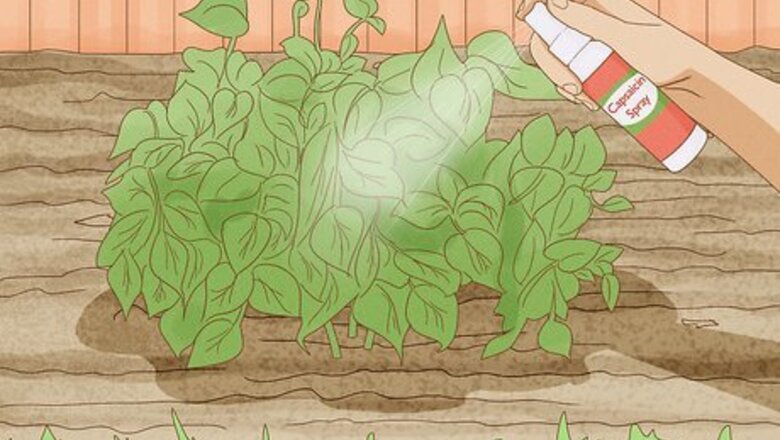
views
- Grow plants pests won't eat, like lamb's ear, or that smell strong, like sage.
- Protect your garden with fences or raised beds, which block out animals.
- Take advantage of decoy predators, noise, and light to scare off critters.
- Spray deterrents like hot pepper spray on plants so pests won't want them.
Hot pepper spray
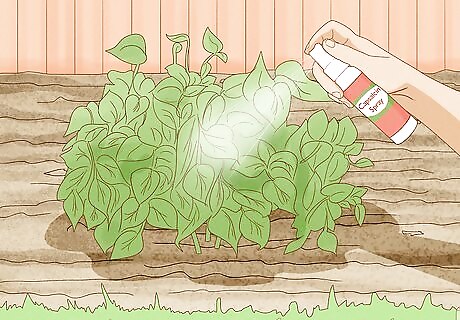
Use hot pepper spray as a spicy solution to make plants inedible. Purchase capsaicin spray, powder, or oil and apply it to any plants that you're worried pests might target. Since any of these products have "capsaicinoids," the chemical that makes hot peppers spicy, they'll act as an irritant that will make critters want to avoid your plants altogether. Other solutions that bother animals include: Milk: Spray 1 part milk to 3 parts water onto plants to deter deer. Soap: Grate a bar of Irish Spring soap and create a ring around plants to keep away animals like chipmunks and deer. Fox urine: Sprinkle granules of fox urine onto the ground to scare off animals like squirrels, rats, skunks, and chipmunks.
Fences
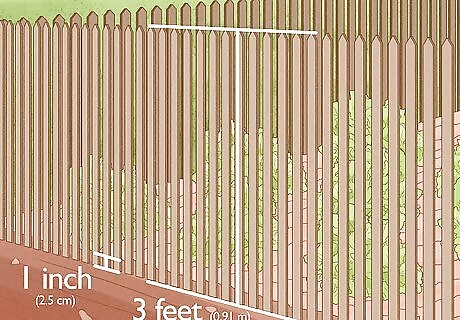
Block out pests with tall garden fences. When you fence in your fruits, veggies, flowers, or herbs, plant it at least 1 inch (2.5 cm) into the ground and at least 3 feet (0.91 m) high—you'll block out both burrowing critters like mice and jumping animals like rabbits. Not only are garden fences ideal for preventing invasions from curious critters, but many are decorative, too. If you're growing a garden that's susceptible to deer damage, you'll need to construct a fence that's at least 8 ft (2.4 m) tall, as deer can jump very high. To make this fence more attractive in the landscape, consider growing attractive vining plants on the fence and using the fence itself as a trellis. You can also use an electric fence to keep deer and other critters like groundhogs out of a garden. The electric fence often works more as a psychological barrier because the correct way to use this fence is to apply aromatic bait, like an apple scent. The critters smell the bait, get shocked on their sensitive nose, and then tend to avoid the fence because of the association with the shock experience.
Covers
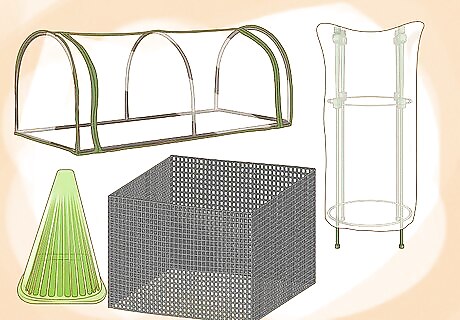
Make plants impossible to gnaw on with special plant covers. Give your garden an extra layer of security with any number of plant covers on the market—most are designed out of a netted or mesh material so your greenery can breathe and get water while staying pest-free. Wire plant protector: A netted dome that can be placed over edible goodies, like lettuce, to keep any animals from gnawing on them. Also known as a "cloche." Seedling plant protector: A rigid mesh tube that deters animals like rabbits and deer from chewing on tall plants. Plant cover: A tiny tent made out of a tarp-like material. A plant cover conceals rows of plants so pests can't see or eat them. Mini garden greenhouse: A portable greenhouse that you can assemble quickly. Some even have shelves that offer vertical storage. A great solution to block pests from a wide variety of potted greenery.
Pots or raised beds
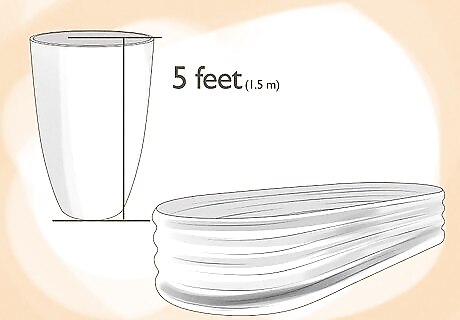
Make your plants too hard for pests to reach with tall pots and beds. Elevate your plants by placing them in large pots, also known as "planters"—for example, try one that's 5 feet (1.5 m) so it's too high for rabbits or deer to get to.Alternatively, keep your greenery in raised garden beds. Their height and their fenced in frames will prevent animals from munching on your flowers or produce. For an added boost that'll provide even more protection, invest in an elevated planter or a planter with stilts.
Veggies, flowers, and herbs animals dislike
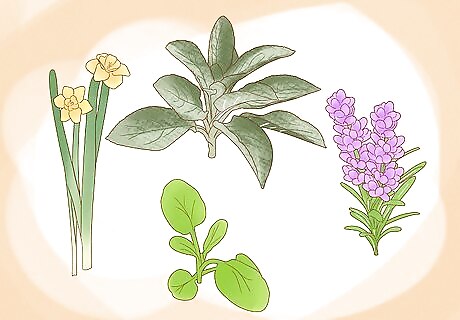
Select a variety of plants that your unwanted guests won't find tasty. Since a lot of animals are omnivores, they're attracted to all sorts of goodies in your garden. They're usually really fond of fruits, veggies, and nuts. In order to discourage them from dining on everything you've grown, plant greenery that lots of pests don't crave, like: Tough and chewy leaves, such as lamb's ears Strong smelling herbs and vegetables, such as sage and lavender Poisonous flowers, such as daffodils and foxgloves. Just don't grow these if you have pets or children!
Common repellents
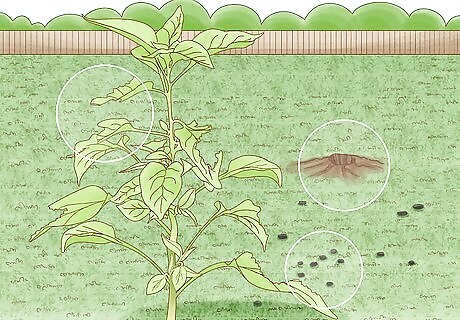
Look for signs of certain animals to choose the right repellent. Investigate and search for telltale clues that common unwanted guests have invaded your garden: Deer: Missing leaves, black pellets, tracks Grow plants deer don't like, such as flowers that are toxic to them (daffodils, foxgloves, and poppies) or too smelly (peonies and irises), as well as fragrant herbs (lavender and sage). Rabbits: Pea-sized droppings, holes in the ground, tufts of fur Fence and net small plants, roll chicken wire around large plants, block places where they can burrow (brush, shrubs, tall grass, and rock piles), scare them with flashing lights or fake owls. Squirrels: Shallow holes, bite marks on plants, missing fruits and veggies Clean up fallen fruit and veggies, fully close lids on compost and garbage bins, coat plants with hot pepper spray, peppermint oil, or vinegar. Mice: Small brown droppings, openings to underground tunnels Swap mulch that mice like to nest in for wood chips, leave a cat out, plant mint Skunks: Musky smells, shallow holes, damaged leaves Fill their “den” holes with leaves, straw, or kitty litter, scare them off with light or noise Opossums: Scratch marks on garbage cans, foul smells, missing produce Install fencing, place garlic in your yard, remove overripe fruits and veggies from your garden Raccoons: Lots of holes in your garden or mulch piles, empty bird feeders Set raccoon traps, scatter blood meal around your garden, apply a mix of garlic and chili powder onto your plants Birds: Torn up grass, stray feathers, piles of droppings, gatherings of birds Cast a net over your plants, set down a scarecrow or a "screech owl" in your garden to scare birds, pour whiskey onto the ground as tasty distraction
Scary items or sounds
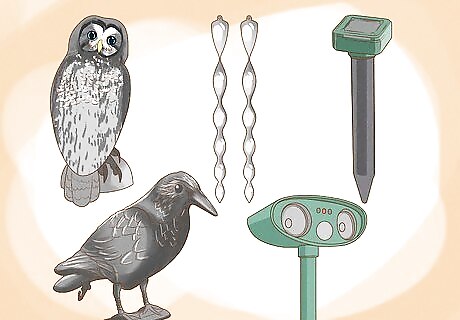
Frighten animals off with nerve-wracking noises or props. Startle unwanted critters with intimidating props like scarecrows, disorienting effects like flashing lights, and motion-activated products like lasers and decoy kites. Try out other scare tactics that are sure to make animals scurry away, like: A solar, ultrasonic animal repellent with flashing lights An owl decoy with reflective tape or one with a rotating head A realistic feathered crow decoy Some sonic spikes to deter snakes, gophers, and moles
A guard dog or cat
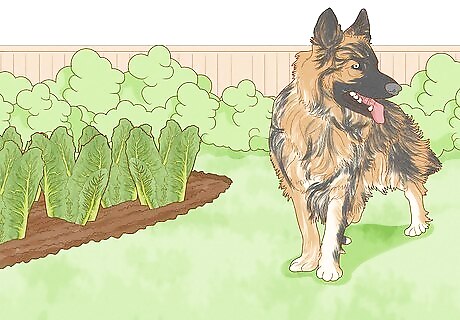
Have one of your pets watch over your plants and fend off pests. Since most garden pests are small and shy animals looking for free food, let a larger or more aggressive pet—like a dog or a cat—roam around. Their intimidating presence should be enough to make critters lose their curiosity and leave the area. Consider a guard dog that fiercely protects its territory but is also super easygoing with your friends and family members—for example, adopt a breed like a German Shepherd. Bring home a cat that loves to hunt rodents, like a short-haired Siamese cat or a fluffy but imposing Maine Coon.
Wild grass, weeds, and shrubs
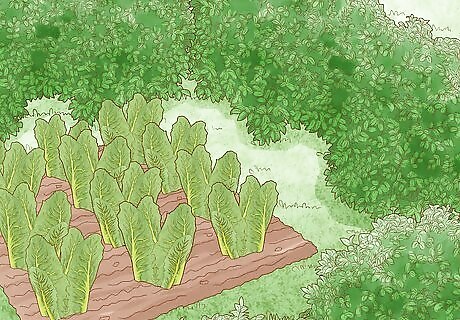
Let grass and weeds grow high so animals won't see all your plants. Feel free to keep any shrubs that pop up, too. Leave all of these extra forms of greenery in your garden—they're great distractions for pests, who might prefer to munch on these because they're the first snacks they see. Aim to keep random grasses, weeds, and shrubs on the outer edges of your garden. When pests dine on them in these spots, they're a lot less likely to make their way to the middle of your yard where all your favorite plants are.
Backup plants or plots
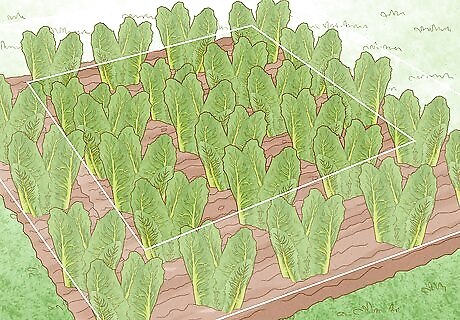
Grow more than you actually need so critters don't eat your entire stock. Make peace with the fact that your hard work and the fruits of your labor will attract some fans! Since animals are really likely to help themselves to a portion of your produce, just have some backup. When you grow more than pests can possibly eat, you'll have a great harvest to bring home. Remember—no matter what, losing crops or getting them damaged is really normal whenever you're farming or gardening. Celebrate the goodies you are able to collect!
Indoor protection
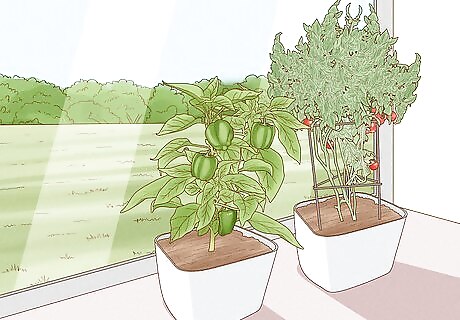
As a last resort, keep your plants inside so animals can't bother them. If you want to be extra cautious and really prize some choice crops, give them shelter in your home. This super easy trick will keep your greenery "out of sight" and "out of mind" so pests can't even touch it. Just check that your fruits, veggies, flowers, or herbs get enough light and can thrive indoors!



















Comments
0 comment